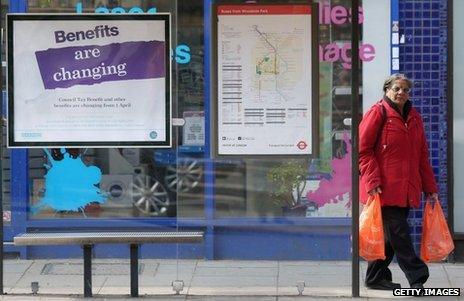Welfare reform and the prosperity gap
- Published
- comments

Will the welfare reforms widen or narrow the gap between rich and poor communities in the UK? According to new research published by Sheffield Hallam University on Thursday, cuts to benefit payments will "widen the gaps in prosperity".
The Department of Work and Pensions, however, argues the changes will benefit poorer regions because they "help people back into work - which will benefit the economy more than simply abandoning them to claim benefits year after year."
Here, laid bare, is a fundamental question for the future well-being of the UK. If Iain Duncan-Smith is able to squeeze billions from the welfare bill by getting people into jobs, then he will have achieved what politicians of all hues have failed to do in decades. Deprived post-industrial towns and cities will bloom again.
But the concern is that the welfare reforms will actually take far more money out of fragile poor economies than rich ones, making old industrial areas even less attractive to investors and entrepreneurs. There won't be the jobs for claimants to get into.
The Sheffield Hallam research assesses the geographical consequence of welfare reforms by comparing claimant caseloads in local authorities and factoring in the DWP's own impact assessments. It calculates that, by 2015, a whopping £19bn will be taken out of working-age benefits each year - but the effects are far from even.
Ranking the overall impact in terms of the effect upon the average working-age adult in each place, the town hardest hit is Blackpool, where the annual loss per adult is calculated at £914. One really has to hope new jobs do come because this is a place with pockets of truly shocking deprivation. Over a quarter of the town receives working-age benefits.
One of the authorities affected least by the welfare reforms is Hart in Hampshire - a community which enjoys precisely zero wards designated as deprived. Here the average working-age adult will lose £241, according to the Sheffield Hallam study, just over a quarter of the impact felt in Blackpool.
In London, the contrast is stark. In the City of London, the loss per head is said to be just £177, while in neighbouring Westminster it is £821 - mostly down to the loss of housing benefit. The cap on housing benefit will cost the average Westminster adult £387 a year, while the under-occupancy charge - or bedroom tax - sees a further loss of £64.
Since the data looks at the effect on ALL working-age adults regardless of whether they receive benefits, the financial impact on individual claimants is even greater.
Changes to incapacity benefit hit hardest in south Wales and the west of Scotland.
It is, of course, no surprise that changes to welfare affect those places where more people are claiming benefits. But according to one of the authors of the Sheffield Hallam research, Steve Fothergill, there are worrying economic and social consequences.
"A key effect of the welfare reforms will be to widen the gaps in prosperity between the best and the worst local economies across Britain. Our figures also show that the coalition government is presiding over national welfare reforms that will impact principally on individuals and communities outside its own political heartlands."
The counter argument is that it is precisely those communities which have become most reliant on benefits that can profit most from reforms designed to ensure people are always better off in work than on welfare.
The Department of Work and Pensions said this: "Around nine out of 10 working households will be better off by on average almost £300 a year as a result of changes to the tax and welfare system this month. Raising the personal allowance to £10,000 will have lifted 2.7m people out of income tax since 2010.
"These changes are essential to keep the benefits bill sustainable, so that we can continue to support people when they need it most across the UK."
The local and regional impact of welfare reform is of more than academic interest. If the government is right, deprived communities will experience a renaissance. If the researchers in Sheffield are right, the cuts to benefits will see the poorest communities in Britain suffer further decline.